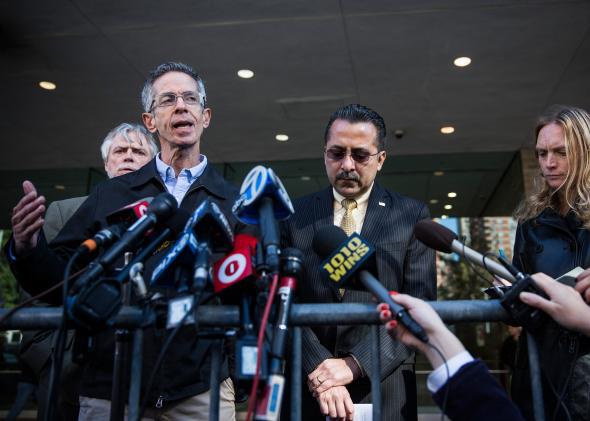For a number of prominent HIV/AIDS activists, the anti-Ebola quarantine measures currently cropping up in states like New York and New Jersey feel familiar—frighteningly so.
At a press conference in New York on Thursday, leaders from many activist organizations—including ACT UP, Housing Works, the Latino Commission on AIDS, and the Gay Men’s Health Crisis—gathered to protest against strict quarantine rules such as the ones introduced by Govs. Andrew Cuomo and Chris Christie last Friday, in which health professionals returning from Ebola-beset West Africa must be isolated for 21 days upon landing at airports in their states. The activists accused the officials of basing polices not in science—according to researchers, Ebola can only be contracted by direct contact with infected bodily fluids; asymptomatic carriers are not contagious—but in fear. They also suggested that some politicians are using the situation as a way to score points on Election Day.
“These are policies that are based in polemics to garner additional votes in upcoming elections and to appease a hysterical electorate,” Eric Sawyer, the co-founder of ACT UP, told MSNBC. Sawyer’s group has demanded an “immediate end to mandatory quarantines and travel bans in the U.S,” along with other goals, including “a guarantee that all US hospitals are sanctuaries for undocumented immigrants to receive care and “an end to stigmatizing the sick.”
But why should HIV/AIDS advocates be concerned over Ebola or quarantines in particular? As Peter Staley, a noted activist and one of the subjects of the documentary How to Survive a Plague, noted in a Facebook post on Thursday, this kind of hysteria has happened before. Staley recounted ACT UP’s participation in the 1987 New York City gay pride parade: “There had been calls from various politicians for quarantining people with HIV/AIDS, so ACT UP created a ‘quarantine camp’ on top of a flat-bed truck, warning gay New Yorkers that this could be their future if they didn’t ‘act up’ and ‘fight back.’ ”
Despite these and other protests, laws restricting the freedoms of those infected with HIV, including travel and immigration bans, went into effect around the world, and the most severely affected communities were stigmatized and widely discriminated against—a situation that only served to fuel the intensity of the epidemic. Our response to the Ebola threat is still being formulated, so it’s important to draw lessons from the past: As any student of the AIDS crisis will quickly learn, stigmatization and panic are often more dangerous than the disease itself.
